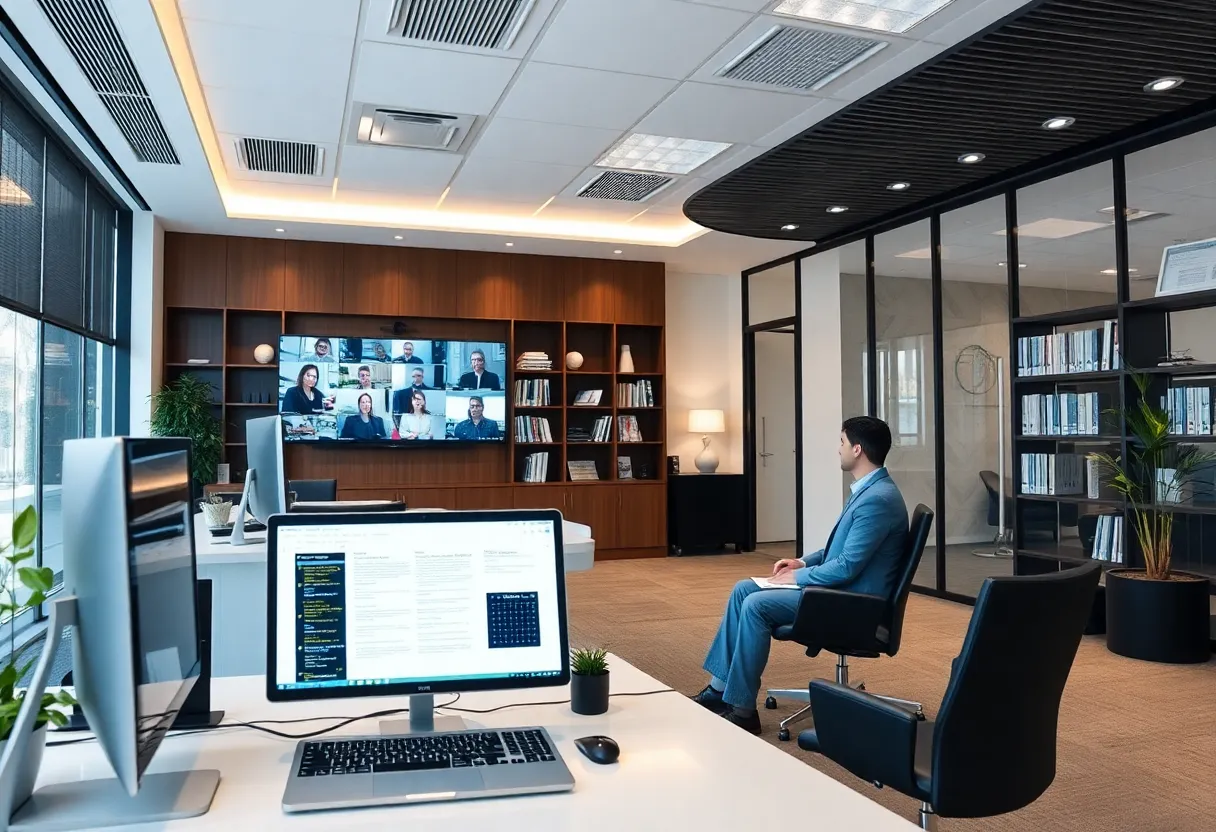

A welcoming and technologically advanced law office environment for client consultations.
The legal industry faces challenges as many law firms cling to outdated practices amidst rapid technological advancements. Clients experience increased stress due to archaic procedures, such as requiring physical meetings and signatures. The demand for modern solutions including video conferencing and direct attorney communication is growing, while ethical issues continue to challenge the profession. To remain relevant, law firms must balance technology with personal interactions, enhancing client relationships while maintaining essential legal standards.
In a world where technology transforms every industry, many law firms remain entrenched in outdated practices, operating much like they did decades ago. Despite the obvious benefits of modern communication, traditional methods still dominate the legal landscape. Clients are often expected to physically visit law offices for initial consultations, and face-to-face meetings continue to be the norm, even when technology offers more efficient options.
For clients, especially those navigating personal injury claims, these outdated practices can intensify their challenges. Many are already dealing with significant trauma, and adding unnecessary hurdles to the legal process can exacerbate their stress. Yet, countless firms insist on paperwork requiring physical signatures and prefer in-person meetings that can delay progress, leaving clients feeling neglected and unheard.
The legal industry often adheres to pre-established precedents, which can impede its evolution. As clients face challenging circumstances, the demand for more accessible and efficient legal services grows. It is essential for law firms to embrace modern communication tools, such as text messaging and video conferencing, which can streamline interactions and improve client experience. This shift can particularly benefit those dealing with severe injuries or financial strains, providing a more client-friendly approach.
While the push towards AI tools and cloud-based systems for legal research is on the rise, many of these innovations are not yet up to par. Some available options may complicate rather than enhance attorneys’ work processes. It is crucial for law firms to pursue strategic modernization, focusing on technology that genuinely serves to expedite legal proceedings, thereby allowing lawyers to concentrate on what truly matters—winning cases for their clients.
Amidst the modern push, some law firms continue to prioritize outdated models of client service that rely on intermediaries like case managers and paralegals instead of fostering direct communication between clients and attorneys. This disconnection can erode trust and rapport, essential elements in effective legal representation. Innovative firms recognize the value of personal interactions, ensuring that clients have direct access to their lawyers throughout the legal process.
Successful firms prioritize not only professional credentials but also the personal philosophy of their staff. A focus on client care is paramount, as neglecting it can lead to clients seeking help elsewhere. Ensuring open lines of communication and demonstrating genuine concern for a client’s needs is vital in today’s fast-paced legal environment. Personal relationships can significantly enhance the attorney-client experience.
While some law firms are examining their service models, others grapple with pressing ethical concerns that have surfaced. Legal professionals face scrutiny over misconduct, particularly when allegations arise of false statements or financial mismanagement. Recently, a prominent attorney became embroiled in controversy after mistakenly transferring funds to the wrong individual, resulting in subsequent aggressive communication and questionable legal actions. Such instances highlight the need for rigorous ethical standards within the profession.
As the legal industry continues to evolve, it is essential that firms harness technology to enhance, not replace, the human element of their practice. Embracing modern methods should not come at the cost of personal interactions, which remain a cornerstone of effective representation. Finding this balance will be crucial as lawyers navigate the demands of contemporary clients while adhering to the fundamental principles of the legal profession.
Top Lawyer Recognition for Munger, Tolles & Olson in IP Law
Trump Nominations: Lawyer Stanley Woodward Jr. Takes Center Stage
SEOST Digital Marketing Conference Set to Transform Marketing Landscape in Chandler, Arizona
New York Lawyers Address Tougher Data Breach Notification Law
EvenUp Honors Innovative Lawyers with Personal Injury Awards
JSM Injury Firm APC Expands Legal Services Across California
Monkeys Escape from Research Facility in South Carolina
Lawyer Insight: Legal Landscape Heating Up Across Courtrooms
Charleston Unveils Five-Year Economic Strategy
Legal Insights from Salt Lake City: Road Hazards Revealed by Injury Lawyer
News Summary Columbia, SC, is buzzing as they celebrate Dawn Staley, head coach of the…
News Summary Crews are making significant strides in containing a wildfire in the Carolina Forest…
News Summary Mikal Mahdi was executed by firing squad in South Carolina on April 11,…
News Summary A mass shooting in Myrtle Beach, South Carolina, on Saturday night resulted in…
News Summary The 2025 Nevada legislative session features proposed bills that may transform personal injury…
News Summary Broughton Injury Law, founded in Henrico, Virginia, has emerged as a significant player…